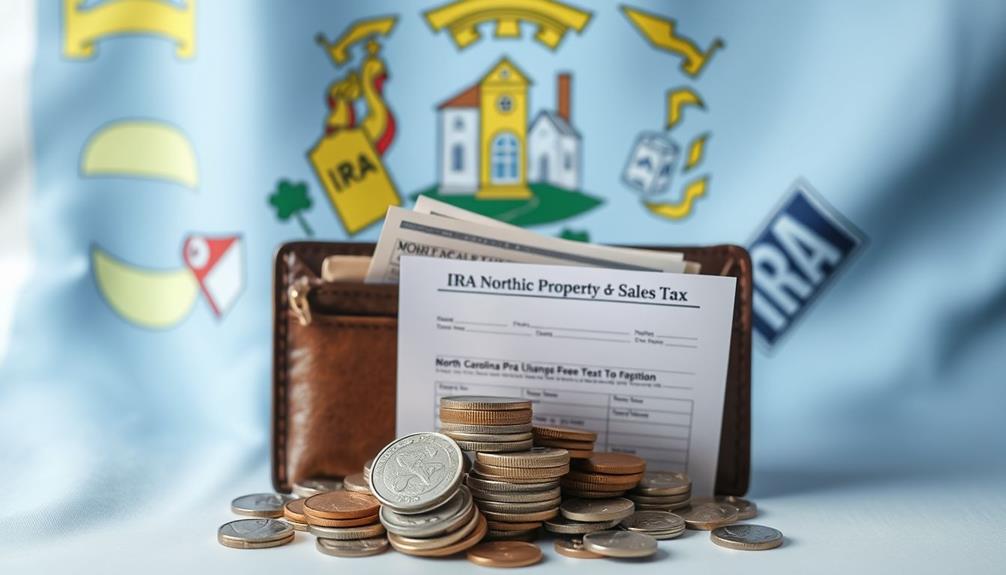If you are thinking about making IRA withdrawals in North Carolina, it is crucial to be aware that they will be subject to a flat state tax rate of 4.75%. This specifically applies to Traditional IRA distributions, which can have an impact on your overall tax responsibilities. Careful planning is essential in this situation. It is important to note that there are no tax exemptions for these withdrawals, and the state’s tax laws may change by 2026, potentially reducing rates to 3.99%. On the other hand, Roth IRA withdrawals may be exempt from taxes under certain circumstances. Having a good understanding of these details can help you maximize your retirement income. Be on the lookout for advice on strategic tax planning to improve your financial security during retirement.
Key Takeaways
- Traditional IRA withdrawals are taxed at a flat state rate of 4.75% in North Carolina, impacting overall tax liability.
- Social Security benefits are fully exempt from state income taxes, providing additional financial relief for retirees.
- Roth IRA withdrawals are tax-exempt if held for at least five years and the account holder is 59½ or older.
- Timing and strategy for Traditional IRA withdrawals are crucial to minimize tax burdens and align with financial goals.
- North Carolina does not have estate or inheritance tax, enhancing the appeal of retirement planning in the state.
North Carolina Tax Overview

When considering retirement in North Carolina, it's essential to understand the state's tax landscape. North Carolina imposes a flat personal income tax rate of 4.75% on most retirement income, including IRA withdrawals. This means your traditional IRA and 401(k) withdrawals will be taxable at both the federal and state levels, which can impact your overall retirement budget.
Investing in options like a Gold IRA can provide a hedge against inflation and diversify your retirement portfolio, potentially enhancing your financial security during retirement. Additionally, Gold IRAs offer tax advantages that may help mitigate some of the tax impact on your withdrawals.
However, there's good news: Social Security benefits are fully exempt from state income taxes, offering you some financial relief as you plan your retirement. Additionally, certain public pensions may qualify for tax exemptions based on age and length of service, potentially reducing your taxable income further.
While you'll face taxes on most retirement accounts, North Carolina stands out for having no estate or inheritance tax. This absence of an estate tax can enhance the appeal of retiring in the state, allowing you to pass on more of your hard-earned savings to your beneficiaries.
Taxation of Traditional IRA Withdrawals

When you withdraw from a Traditional IRA in North Carolina, those funds count as taxable income at the state's flat rate of 4.75%.
It's essential to plan your withdrawals carefully, taking into account both state and federal tax implications.
Additionally, if you're exploring options for diversifying your retirement portfolio, you may want to think about rolling over your IRA to a Gold IRA for potential tax advantages and protection against market volatility tax advantages available when rolling over 401k to Gold IRA.
As the state tax rate is set to decrease in the coming years, understanding how this affects your overall tax liability can help you make smarter financial decisions.
State Tax Rate
Although many retirees look forward to enjoying their hard-earned savings, it's important to understand that withdrawals from traditional IRAs in North Carolina are taxable and subject to a state income tax rate of 4.75%. This flat income tax rate applies to most retirement income sources, including traditional IRA distributions.
Additionally, considering the diverse investment options available for retirement, many investors might explore alternatives such as Gold IRAs to enhance their portfolio. When planning your withdrawal strategies, keep in mind that these IRA withdrawals will increase your taxable income for the year.
Unlike some states, North Carolina doesn't offer specific deductions for traditional IRA withdrawals, which can affect your overall tax liability.
To navigate state taxes effectively, it's vital to consult with financial advisors who can help you understand how these withdrawals will impact your state tax obligations. They can assist you in creating a strategy that minimizes your state income tax and maximizes your retirement income.
Taxable Income Considerations
Understanding the taxation of traditional IRA withdrawals is essential for effective retirement planning. In North Carolina, these withdrawals are considered taxable income and are subject to a flat state income tax rate of 4.75%.
Unlike Social Security benefits, which are exempt from state income tax, distributions from Traditional IRAs don't enjoy any tax exemptions. This means that as you withdraw from your IRA, you'll need to account for how these distributions affect your overall tax liability.
Being aware of the tax implications of IRA withdrawals is important, especially for retirees. These distributions can greatly impact your retirement income planning, potentially pushing you into a higher tax bracket.
Regular updates on North Carolina's tax laws are critical since the state plans to lower the income tax rate to 3.99% between 2024 and 2026, which could benefit your financial strategy.
To navigate the complexities of taxable income from IRA withdrawals, consider consulting a tax professional. They can help you understand the best approach to optimize your retirement income while minimizing tax obligations, ensuring your financial strategy aligns with your long-term goals.
Withdrawal Planning Strategies
Effective withdrawal planning can greatly impact your tax situation during retirement. In North Carolina, withdrawals from Traditional IRAs are subject to state income tax at a flat rate of 4.75%.
Unlike Social Security benefits, which are fully exempt from state income tax, these distributions don't qualify for deductions or exemptions. Consequently, the timing of withdrawals becomes vital; taking them at the wrong time could push you into a higher tax bracket, increasing your overall retirement taxes.
To optimize your financial situation, it's important to incorporate both federal and state tax implications into your withdrawal strategy. Consider a personalized withdrawal strategy that aligns with your overall financial goals, minimizing tax liabilities associated with Traditional IRA distributions.
Effective financial forecasting will help you project your income and expenses accurately, ensuring you don't face unexpected tax burdens.
Don't navigate this complex landscape alone. It's advisable to consult a tax professional who can guide you through the intricacies of IRA withdrawals and help you develop a tailored plan.
Their expertise can greatly enhance your retirement experience and preserve your hard-earned savings.
Roth IRA Withdrawal Benefits

Roth IRA withdrawals offer a powerful advantage for retirees looking to maximize their financial freedom. In North Carolina, these withdrawals come with significant tax benefits, especially if you've held your account for at least five years and are 59½ or older. Since contributions are made with post-tax dollars, qualified withdrawals are tax-exempt, allowing you to boost your disposable income without increasing your taxable income.
Unlike traditional IRAs, Roth IRAs aren't subject to Required Minimum Distributions (RMDs), giving you greater flexibility in managing your retirement income. This means you can decide when to take distributions based on your financial needs, rather than being forced to withdraw funds at a certain age.
Moreover, North Carolina's retirement-friendly tax environment complements these advantages, as Social Security benefits are also exempt from state taxes.
Understanding the rules and benefits of Roth IRA withdrawals can enhance your financial planning strategies, enabling you to optimize your retirement income and enjoy your golden years without the stress of tax liabilities.
State Tax Exemptions for Retirees

Retirees in North Carolina can take advantage of several state tax exemptions that greatly enhance their financial well-being. Understanding these exemptions can help you maximize your retirement income and enjoy a more secure financial future.
- Social Security benefits: These are fully exempt from state income taxes, boosting your disposable income.
- Government pensions: The Bailey exemption allows certain government retirement incomes to be tax-exempt for qualifying individuals.
- Public pensions: Some may qualify for exemptions based on age and duration of service, further reducing your tax liability.
While most retirement income, including withdrawals from traditional IRAs and 401(k)s, is taxed at a flat rate of 4.75%, North Carolina doesn't impose an estate or inheritance tax.
This means you can transfer wealth without additional state tax burdens.
By leveraging these state tax exemptions, you can reduce your overall tax burden and keep more of your hard-earned retirement income.
Make sure to explore these options as you plan your financial future in retirement, ensuring you can make the most of your savings and benefits.
Impact of Property and Sales Taxes

When planning your retirement finances in North Carolina, it's essential to contemplate property tax benefits and sales tax implications.
With an affordable property tax rate and reduced sales tax on groceries, you can stretch your budget further.
Understanding these factors alongside your IRA withdrawal strategy can help you manage your overall cost of living effectively.
Property Tax Benefits
Considering the financial implications of retirement, understanding property tax benefits in North Carolina can greatly ease your budget.
The state boasts an average effective property tax rate of just 0.80%, making it relatively affordable for retirees compared to the national average. Homeowners typically pay around $800 annually for property taxes per $100,000 in home value, contributing to a manageable cost of living.
Here are some key benefits to keep in mind:
- Homestead Exemption: Seniors aged 65 and older may qualify for a property tax exemption, further reducing their tax burden.
- Low Effective Property Tax: North Carolina's low property tax rate allows you to allocate more of your retirement income elsewhere.
- Sales Tax Exemptions: Prescription drugs are exempt from sales tax, helping you manage healthcare costs.
Sales Tax Considerations
Sales tax considerations play an essential role in managing your retirement budget in North Carolina. The state has a combined average sales tax rate of 6.98%, which includes a state sales tax of 4.75% and local taxes that can add up to 2.75%.
For retirees on fixed incomes, understanding these rates is vital. One positive aspect is that grocery sales are taxed at a reduced rate of 2%, providing some relief as you plan your monthly expenses. Additionally, prescription drugs are fully exempt from sales tax, which can greatly lower your medical expenses if you require ongoing medication.
While property taxes in North Carolina average around $800 annually for homeowners per $100,000 in home value, the effective property tax rate stands at a favorable 0.80%.
This low rate benefits retirees, allowing you to keep more of your retirement distributions for other expenses.
Planning for Retirement Income Taxes

Planning for retirement income taxes can feel overwhelming, especially with the nuances of state laws like those in North Carolina. Understanding how your IRA withdrawals will be taxed is essential for effective planning.
In North Carolina, traditional IRA distributions are fully taxable at a flat state income tax rate of 4.75%, unlike exempt Social Security benefits. This means you'll need to factor in these tax implications when determining your retirement income needs.
Here are a few key points to take into account:
- IRA withdrawals are taxable: Most retirement income, except Social Security benefits, will contribute to your taxable retirement income.
- No deductions available: North Carolina doesn't offer deductions for retirement income, so every dollar counts.
- Stay informed: Regular updates on North Carolina's tax environment can impact your withdrawal strategies and overall planning for retirement.
Frequently Asked Questions
Does NC Tax IRA Withdrawals?
Yes, North Carolina taxes IRA withdrawals as taxable income at a flat rate of 4.75%. Unlike Social Security benefits, you won't find any exemptions for IRA distributions, so plan your withdrawals accordingly.
Do You Pay State Taxes on IRA Withdrawals?
When it comes to IRA withdrawals, you'll find yourself in a bit of a pickle. Yes, you do pay state taxes on those distributions, so plan accordingly to avoid any unwelcome surprises during retirement.
Does North Carolina Tax Inherited IRA Distributions?
Yes, North Carolina taxes inherited IRA distributions as taxable income. You'll face a flat income tax rate of 4.75%. It's wise to consult a tax professional to understand your specific situation and obligations.
What Is the Bailey Decision in North Carolina?
The Bailey Decision clarifies tax treatment for certain government pensions in North Carolina, allowing exemptions for qualifying retirees. This ruling helps you understand how public pension income impacts your overall tax liability and financial planning.
Conclusion
Steering through state tax implications for IRA withdrawals in North Carolina might feel like deciphering a secret code, but don't let it overwhelm you! With the right knowledge, you can turn potential tax headaches into financial victories. Imagine sipping sweet tea on your porch, free from tax worries, while your retirement funds work for you. Embrace the benefits of strategic planning and enjoy the fruits of your labor—because you deserve to retire in peace, not in a tax maze!









